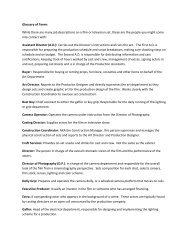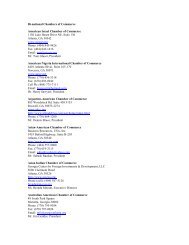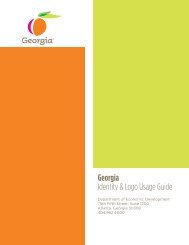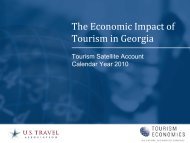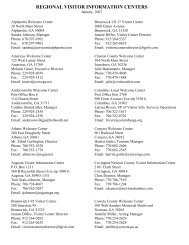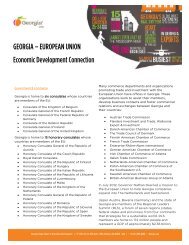Business Incentives - Georgia Department of Economic Development
Business Incentives - Georgia Department of Economic Development
Business Incentives - Georgia Department of Economic Development
You also want an ePaper? Increase the reach of your titles
YUMPU automatically turns print PDFs into web optimized ePapers that Google loves.
<strong>Business</strong> <strong>Incentives</strong>
<strong>Georgia</strong> 2012 Job Tax Credits<br />
GEORGIA 2012 JOB TAX CREDIT TIERS<br />
DADE<br />
59<br />
CATOOSA<br />
WALKER<br />
CHATTOOGA<br />
FLOYD<br />
*<br />
WHITFIELD<br />
75<br />
Rome<br />
BARTOW<br />
MURRAY<br />
*<br />
GORDON<br />
TOWNS<br />
FANNIN<br />
UNION<br />
RABUN<br />
GILMER<br />
WHITE<br />
HABERSHAM<br />
LUMPKIN<br />
STEPHENS<br />
PICKENS<br />
Gainesville<br />
DAWSON<br />
HALL<br />
85<br />
BANKS<br />
CHEROKEE<br />
FRANKLIN HART<br />
575<br />
FORSYTH<br />
Job Minimum # Investment<br />
TIER Tax Credits* New Jobs Credits<br />
1 $4,000 2 5% - 8%<br />
2 $3,000 10 3% - 5%<br />
3 $1,750 15 1% - 3%<br />
4 $1,250 25 1% - 3%<br />
*Includes $500 bonus for Joint <strong>Development</strong> Authority.<br />
CANADA<br />
JACKSON<br />
ELBERT<br />
MADISON<br />
POLK<br />
BARROW Athens<br />
COBB<br />
GWINNETT<br />
CLARKE<br />
PAULDING<br />
OGLETHORPE<br />
OCONEE<br />
WILKES<br />
HARALSON<br />
WALTON<br />
DE KALB<br />
LINCOLN<br />
20 Atlanta<br />
DOUGLAS<br />
GREENE<br />
FULTON<br />
ROCKDALE<br />
MORGAN<br />
TALIAFERRO<br />
CARROLL<br />
CLAYTON<br />
NEWTON<br />
20<br />
MCDUFFIE<br />
HENRY<br />
FAYETTE<br />
WARREN<br />
COWETA<br />
JASPER<br />
PUTNAM<br />
HEARD<br />
85<br />
BUTTS<br />
HANCOCK<br />
SPALDING<br />
GLASCOCK<br />
COLUMBIA<br />
Augusta<br />
RICHMOND<br />
USA<br />
MEXICO<br />
GEORGIA<br />
TROUP<br />
MERIWETHER<br />
PIKE<br />
LAMAR<br />
75<br />
JONES<br />
BALDWIN<br />
JEFFERSON<br />
BURKE<br />
MONROE<br />
WASHINGTON<br />
HARRIS<br />
TALBOT<br />
UPSON<br />
CRAWFORD<br />
BIBB<br />
Macon<br />
TWIGGS<br />
WILKINSON<br />
JOHNSON<br />
JENKINS<br />
SCREVEN<br />
Columbus<br />
MUSCOGEE<br />
MARION<br />
CHATTAHOOCHEE<br />
TAYLOR<br />
MACON<br />
PEACH<br />
HOUSTON<br />
BLECKLEY<br />
LAURENS<br />
16<br />
TREUTLEN<br />
EMANUEL<br />
CANDLER<br />
BULLOCH<br />
EFFINGHAM<br />
STEWART<br />
QUITMAN<br />
*<br />
WEBSTER<br />
SCHLEY<br />
SUMTER<br />
DOOLY<br />
CRISP<br />
PULASKI<br />
WILCOX<br />
DODGE<br />
WHEELER<br />
TELFAIR<br />
MONT-<br />
GOMERY<br />
TOOMBS<br />
EVANS<br />
TATTNALL<br />
BRYAN<br />
LIBERTY<br />
95<br />
Savannah<br />
CHATHAM<br />
RANDOLPH<br />
LEE<br />
TERRELL<br />
Albany<br />
CLAY<br />
WORTH<br />
CALHOUN<br />
DOUGHERTY<br />
TURNER<br />
75<br />
BEN HILL<br />
IRWIN<br />
COFFEE<br />
JEFF<br />
DAVIS<br />
APPLING<br />
BACON<br />
WAYNE<br />
LONG<br />
MCINTOSH<br />
TIFT<br />
EARLY<br />
MILLER<br />
BAKER<br />
MITCHELL<br />
COLQUITT<br />
COOK<br />
BERRIEN<br />
ATKINSON<br />
WARE<br />
PIERCE<br />
BRANTLEY<br />
GLYNN<br />
Brunswick<br />
SEMINOLE<br />
DECATUR<br />
GRADY<br />
THOMAS<br />
BROOKS<br />
LOWNDES<br />
LANIER<br />
Valdosta<br />
CLINCH<br />
CHARLETON<br />
CAMDEN<br />
95<br />
ECHOLS<br />
2<br />
*<br />
Represents counties that are not members <strong>of</strong> a joint development authority (JDA) and thus do not qualify for the $500 JDA bonus.<br />
Job tax credit amounts for these counties are $500 less than indicated on the chart above.<br />
= <strong>Georgia</strong> port.<br />
This map is current-based on information provided by the <strong>Department</strong> <strong>of</strong> Community Affairs as <strong>of</strong> May 2012.
GEORGIA DEPARTMENT OF ECONOMIC DEVELOPMENT<br />
OVERVIEW<br />
The <strong>Georgia</strong> <strong>Department</strong> <strong>of</strong> <strong>Economic</strong> <strong>Development</strong><br />
is the state’s lead agency for attracting new business<br />
investment, assisting with the expansion <strong>of</strong> existing<br />
industry and small businesses, developing new domestic<br />
and international markets, attracting tourists, and<br />
promoting the state as a location for film, video, music,<br />
digital entertainment, and the arts.<br />
The Global Commerce division specifically assists<br />
businesses with an interest in growing or locating in the<br />
state by coordinating a variety <strong>of</strong> services that include site<br />
location, employee training, market research and export<br />
assistance and consultation.<br />
Statewide Project Management and Existing Industry<br />
and Regional Recruitment teams are available to assist<br />
companies seeking to locate in <strong>Georgia</strong> with the items<br />
mentioned above, along with tax incentives and credits<br />
suitable for their industry or business. The Statewide<br />
Project Managers are divided by industry specialty and<br />
<strong>of</strong>fer knowledge within their sectors.<br />
The Existing Industry and Regional Recruitment team<br />
works with <strong>Georgia</strong>’s existing companies to identify<br />
expansion opportunities and new investment projects<br />
specifically targeted for their region. Regional Project<br />
Managers are located in each <strong>of</strong> the 12 regions <strong>of</strong> the<br />
state. The team’s regional knowledge comes from living<br />
and working in these communities and provides a unique<br />
business advantage to clients.<br />
<strong>Georgia</strong> continues to attract successful companies due<br />
to a pro-business environment, a talented workforce,<br />
world-class infrastructure and unparalleled access<br />
to the world market. State-level, performance-based<br />
assistance packages, along with incentives <strong>of</strong>fered by<br />
local municipalities and counties, help new and expanding<br />
ventures get the good start needed for their future success.
GEORGIA BUSINESS INCENTIVES<br />
GEORGIA TAXES<br />
Single Factor Apportionment In 2005, <strong>Georgia</strong> became the first state in the Southeast to adopt a “Single Factor<br />
Gross Receipts” apportionment formula. This apportionment formula treats a company’s gross receipts, or sales in<br />
<strong>Georgia</strong>, as the only relevant factor in determining the portion <strong>of</strong> that company’s income subject to <strong>Georgia</strong>’s six percent<br />
corporate income tax. <strong>Georgia</strong> is one <strong>of</strong> only 13 states currently using Single Factor Apportionment. Most states still<br />
use a traditional apportionment formula in which a company’s in-state property and payroll factor into the calculation<br />
<strong>of</strong> a company’s corporate income tax. Single Factor Apportionment significantly reduces the effective rate <strong>of</strong> <strong>Georgia</strong><br />
income taxation <strong>of</strong> companies with substantial sales to customers outside <strong>Georgia</strong>. In addition, <strong>Georgia</strong> does not use<br />
the so-called “Throw Back Rule,” which many states use to tax income from sales <strong>of</strong> goods or services to out-<strong>of</strong>-state<br />
customers if the customer’s state does not already tax that income.<br />
Example: Assume for the 2011 tax year, In-State Manufacturing Co., Inc. has the following total overall taxable income<br />
and gross receipt sales in <strong>Georgia</strong> as compared to total gross receipts:<br />
Taxable Income: $10 million<br />
Percent <strong>of</strong> Gross Receipts in <strong>Georgia</strong>: 13 percent<br />
Accordingly, in 2011, only $1.3 million <strong>of</strong> In-State Manufacturing Co., Inc.’s income would be subject to <strong>Georgia</strong>’s six<br />
percent corporate income tax, making its corporate income tax liability $78,000.<br />
[($10 million x 13%) x 6%]<br />
CORPORATE TAX CREDITS<br />
<strong>Georgia</strong> <strong>of</strong>fers a range <strong>of</strong> corporate tax credits that enable companies to minimize or completely eliminate state<br />
corporate income taxes which, at six percent, are already among the lowest in the nation.<br />
For some <strong>of</strong> the credits, the amounts are dependent on the “tier status” <strong>of</strong> the community. Tier status refers to an annual<br />
four-tier ranking <strong>of</strong> the economic vitality <strong>of</strong> <strong>Georgia</strong>’s counties. The highest credits are <strong>of</strong>fered in the counties with the<br />
greatest need (Tier 1 and 2 counties), while the most prosperous counties (Tier 3 and 4 counties) <strong>of</strong>fer lesser amounts.<br />
The Tier Map can be found on page two.<br />
Job Tax Credit Companies and their headquarters that are engaged in strategic industries such as manufacturing,<br />
warehousing & distribution, processing, telecommunications, broadcasting, tourism, and research and development may<br />
qualify for <strong>Georgia</strong>’s Job Tax Credit Program. Depending on the community’s tier, companies must create between five and<br />
25 net new full-time jobs in the first year to qualify. Credits may also be accrued for additional jobs created in years 2-5.<br />
4
Jobs created outside <strong>of</strong> year five may not be claimed unless a new threshold for job<br />
creation (year 1) is met. Qualified companies can claim a tax credit with a value <strong>of</strong> $750<br />
– $3,500 per job, per year, beginning with the first taxable year in which the new job is<br />
created and for the following four years the job is maintained. An additional $500 credit is<br />
<strong>of</strong>fered in counties that participate in a multi-county Joint <strong>Development</strong> Authority (JDA).<br />
Increased job tax credits, equal to Tier 1 credits, are also allowed for companies that create<br />
jobs in Less Developed Census Tracts (LDCT), Opportunity Zones (OZ) or Military Zones<br />
(MZ). Opportunity Zones, Military Zones, as well as <strong>Georgia</strong>’s 40 least developed counties<br />
<strong>of</strong>fer job tax credits to businesses <strong>of</strong> any nature, including retail businesses. The credit<br />
value for each county is indicated on the tax credit map on page two.<br />
Credits may be taken against 100 percent <strong>of</strong> state corporate income tax liability in Tier<br />
1 and 2 counties, or against 50 percent <strong>of</strong> state corporate income tax liability in Tier 3<br />
and 4 counties. Credits that are claimed but not used in any taxable year may be carried<br />
forward for 10 years from the close <strong>of</strong> the taxable year in which qualified jobs were<br />
established. Additionally, in Tier 1 counties, excess credits may be credited to <strong>Georgia</strong><br />
payroll withholding taxes (with a limitation <strong>of</strong> $3,500 per job, per year).<br />
Tier Job Tax Credit $ Jobs Use <strong>of</strong> Credits Carry Forward<br />
1 $3,500 - $4,000* 5<br />
100% <strong>of</strong> tax liability<br />
- excess to withholding tax up to $3,500<br />
10 years<br />
2 $2,500 - $3,000* 10 100% <strong>of</strong> tax liability 10 years<br />
3 $1,250 - $1,750* 15 50% <strong>of</strong> tax liability 10 years<br />
4 $750 - $1,250* 25 50% <strong>of</strong> tax liability 10 years<br />
MZ/OZ $3,500 2<br />
LDCT $3,500 5<br />
100% <strong>of</strong> tax liability<br />
- excess to withholding<br />
100% <strong>of</strong> tax liability<br />
- excess to withholding<br />
10 years<br />
10 years<br />
* Includes $500 bonus for Joint <strong>Development</strong> Authority. <strong>Georgia</strong> counties can form partnerships which benefit<br />
companies with this $500 Job Tax Credit bonus. There are currently only three counties in <strong>Georgia</strong> that do not<br />
participate in a JDA: Whitfield, Murray and Webster.<br />
Example: Taxpayer creates 50 jobs in a Tier 1 county <strong>of</strong>fering a $4,000 credit, receives<br />
$1 million in tax credits over five years to reduce or eliminate <strong>Georgia</strong> income tax<br />
[50 jobs x $4,000 x 5 years = $1 million].
Port Tax Credit Bonus The Port Tax Credit Bonus is available to taxpayers who increase<br />
imports or exports through a <strong>Georgia</strong> port by 10 percent over the previous or base year.<br />
Base year port traffic must be at least 75 net tons, five containers or 10 TEUs (twentyfoot<br />
equivalent units); if not, the percentage increase in port traffic will be calculated using<br />
75 net tons, five containers, or 10 TEUs as the base. The port tax credit bonus can be used<br />
with either the Job or the Investment Tax Credit program, provided that the company<br />
meets the requirements for one <strong>of</strong> those programs. Port Tax Credits may be used to <strong>of</strong>fset<br />
up to 50 percent <strong>of</strong> the company’s corporate income tax liability. Unused credits may be<br />
carried forward for 10 years, provided that the increase in port traffic remains above the<br />
minimum level and that the company continues to meet the job or investment tax credit<br />
requirements. Note that the Port Tax Credit Bonus cannot be utilized with the Quality Jobs<br />
Tax Credit and can only be used in Opportunity Zones, Military Zones and Less Developed<br />
Census Tracts in limited cases by existing large distribution centers. The <strong>Georgia</strong> Ports are<br />
indicated on the Tier Map found on page one.<br />
Port Tax Credit Bonus for JOB Tax Credits This “port bonus” is an additional $1,250 per<br />
job credit for taxpayers with qualified increases in shipments through a <strong>Georgia</strong> port. The<br />
$1,250 is added to the Job Tax Credit.<br />
Example: Taxpayer that creates 50 jobs in a Tier 1 county and increases its port traffic by<br />
at least 10 percent is eligible to receive the port bonus. Taxpayer is eligible for $1,312,500<br />
in tax credits spread over five years to reduce or eliminate <strong>Georgia</strong> income tax: [50 jobs<br />
x ($4,000 job tax credit + $1,250 port tax credit bonus) x 5 years] = $1,312,500.<br />
Port Tax Credit Bonus for INVESTMENT Tax Credit This “port bonus” increases the<br />
Investment Tax Credit to the equivalent <strong>of</strong> a Tier 1 location regardless <strong>of</strong> the tier level.<br />
The port bonus would therefore be equal to five percent <strong>of</strong> the qualified investment in<br />
expenses directly related to manufacturing or providing telecommunication services<br />
with the credit increasing to eight percent for recycling, pollution control and defense<br />
conversion. See page 12 for additional information on Investment Tax Credits.<br />
Example: Taxpayer qualifies for a port bonus in a Tier 4 county, invests $100 million in a<br />
manufacturing plant plus $25 million in recycling equipment. Taxpayer is eligible for a $7<br />
million investment tax credit to reduce or eliminate <strong>Georgia</strong> income tax: [$100 million x<br />
5%] + [$25 million x 8%] = $7 million.
Quality Jobs Tax Credit Companies that create at least 50 jobs in a 12-month period where each job pays wages at<br />
least 110 percent <strong>of</strong> the county average are eligible to receive a tax credit <strong>of</strong> $2,500-$5,000 per job, per year, for up to<br />
five years, based on the scaled system below. New quality jobs created within seven years can qualify for the credit.<br />
Credits may be used to <strong>of</strong>fset the company’s payroll withholding once all other tax liability has been exhausted, and may<br />
be carried forward for 10 years. New jobs that do not meet the requirements for the Quality Jobs Tax credit may count<br />
toward the Jobs Tax Credit Program if they meet the eligibility requirements for that program separately. For Current<br />
Average County Wages, visit http://explorer.dol.state.ga.us/mis/Current/ewcurrent.pdf.<br />
Average Wage Requirement<br />
(% <strong>of</strong> county average)<br />
Credit Value per<br />
NEW Quality Job<br />
≥110% and
Mega Project Tax Credit Companies that<br />
employ at least 1,800 net new employees,<br />
and either invest a minimum <strong>of</strong> $450 million<br />
or have a minimum annual payroll <strong>of</strong> $150<br />
million may claim a $5,250 per job, per year<br />
tax credit for the first five years <strong>of</strong> each net<br />
new job position. Credits are first applied<br />
to state corporate income tax, with excess<br />
credits eligible for use against payroll<br />
withholding. Credits may be carried forward<br />
for 10 years.<br />
Child Care Tax Credits Employers who<br />
purchase or build qualified child care<br />
facilities are eligible to receive <strong>Georgia</strong><br />
income tax credits equal to 100 percent <strong>of</strong><br />
the cost <strong>of</strong> construction. The credit for the<br />
cost <strong>of</strong> construction is spread over 10 years<br />
[10 percent each year]. Unused child care<br />
credits from the purchase or construction<br />
<strong>of</strong> a child care facility can be carried<br />
forward three years. The child care facility<br />
must be licensed by the state.<br />
Employers who provide or sponsor child<br />
care for employees are eligible for a credit<br />
against <strong>Georgia</strong> income tax equal to 75<br />
percent <strong>of</strong> the employer’s direct costs.<br />
Credits that are related to the operating<br />
cost <strong>of</strong> the facility may be carried forward<br />
five years. All child care credits can be used<br />
against 50 percent <strong>of</strong> the taxpayer’s income<br />
tax liability in a given year.<br />
Work Opportunity Tax Credit Program<br />
(WOTC) The <strong>Georgia</strong> <strong>Department</strong> <strong>of</strong><br />
Labor (GDOL) coordinates the federal<br />
Work Opportunity Tax Credit Program.<br />
The WOTC program is a federal tax credit<br />
incentive that the U.S. Congress provides<br />
to private-sector businesses for hiring<br />
individuals from nine target groups who<br />
have consistently faced significant barriers<br />
to employment. Among others, target<br />
groups include certain TANF (Temporary<br />
Assistance for Needy Families) and food<br />
stamp recipients, and certain residents<br />
<strong>of</strong> an Empowerment Zone (EZ) or Rural<br />
Renewal County (RRC). Participating<br />
companies are compensated by being able<br />
to reduce their federal income tax liability<br />
with a tax credit between $1,200 to $9,000<br />
per qualified employee, depending on the<br />
target group. The most frequently certified<br />
WOTC is $2,400 for each adult new hire.<br />
An employer must request and receive<br />
certification from the <strong>Georgia</strong> <strong>Department</strong><br />
<strong>of</strong> Labor that the new hire is a member <strong>of</strong> at<br />
least one <strong>of</strong> the nine WOTC target groups<br />
before the employer can claim the WOTC on<br />
its federal income tax return.<br />
www.doleta.gov/business/incentives/<br />
opptax/
TAX EXEMPTIONS<br />
Sales and Use Tax Exemption Qualified equipment<br />
purchases or leases are exempt from sales tax when the<br />
equipment purchased is used in the manufacturing process.<br />
Under certain conditions, primary material handling<br />
equipment (in warehouses and distribution centers),<br />
computer equipment and Class 100 (or less) clean room<br />
machinery, equipment and materials can also be exempted.<br />
Inventory Tax Exemption Effective January 1, 2011,<br />
business inventory is exempt from state property taxes<br />
(0.25 mills). Many <strong>Georgia</strong> counties also exempt from<br />
property tax up to 100 percent <strong>of</strong> qualified raw material,<br />
work-in-process and finished goods inventory under<br />
<strong>Georgia</strong>’s local-option “Freeport” law. In most <strong>of</strong> these<br />
counties, distribution center and warehouse inventories<br />
are exempt if the inventory is destined to be shipped out<br />
<strong>of</strong> state.<br />
Foreign-Trade Zone (FTZ) <strong>Georgia</strong> is home to multiple<br />
FTZ sites and is a recognized leader in working with<br />
companies to facilitate use <strong>of</strong> the program. Importing and<br />
exporting are central to many businesses’ success, and<br />
the program streamlines those activities and lowers costs.<br />
The FTZ program allows qualified companies to defer,<br />
decrease, or eliminate duties on materials imported from<br />
overseas that are used in products assembled in <strong>Georgia</strong>.<br />
Whether your company’s needs are best served by locating<br />
in one <strong>of</strong> <strong>Georgia</strong>’s industrial parks with FTZ designation,<br />
or applying for FTZ designation <strong>of</strong> an individual facility<br />
located elsewhere in <strong>Georgia</strong>, we can connect you with the<br />
right contacts to assist with the process.<br />
9<br />
8
HIRING, TRAINING AND EDUCATION<br />
Hiring Assistance <strong>Georgia</strong>’s <strong>Department</strong> <strong>of</strong> Labor (GDOL) assists companies in recruitment<br />
by posting job notices, collecting and screening applications and/or résumés, providing<br />
interview space, scheduling interviews and hosting job fairs. GDOL will work with private<br />
employment agencies that list jobs with the state.<br />
Quick Start Employee Training <strong>Georgia</strong>’s nationally-ranked employee training program,<br />
Quick Start, provides customized training for new employees in skill-based jobs at no<br />
cost to qualifying companies. The training program is given to the company for its<br />
future use. Quick Start provides training space, instructors and all needed materials<br />
related to the program, potentially saving companies millions <strong>of</strong> dollars in training costs.<br />
<strong>Georgia</strong>QuickStart.org<br />
<strong>Georgia</strong> Work Ready <strong>Georgia</strong> Work Ready is available for companies meeting minimum<br />
hiring requirements and is easy to access through the state’s network <strong>of</strong> technical colleges.<br />
<strong>Georgia</strong> companies can implement Work Ready two ways - through job pr<strong>of</strong>iling and Work<br />
Ready Certificates. Work Ready job pr<strong>of</strong>iles identify the job tasks and skill levels necessary<br />
to be successful in any job. Companies match those pr<strong>of</strong>iles to employees’ Work Ready<br />
Certificates, which measure core skills, to ensure the right person is placed in the right job.<br />
gaworkready.org<br />
Retraining Tax Credit A company’s direct investment in training can be claimed as a<br />
tax credit. The credit is available to all <strong>Georgia</strong> businesses that file a <strong>Georgia</strong> income tax<br />
return. 50 percent <strong>of</strong> the employer’s direct cost, up to $500 per full-time employee, per<br />
approved training program, may be claimed as a credit. The total amount <strong>of</strong> credit cannot<br />
exceed $1,250 per employee per year. Training programs must be approved by the Technical<br />
College System <strong>of</strong> <strong>Georgia</strong>. The retraining program must be for quality and productivity<br />
enhancements and certain s<strong>of</strong>tware technologies. This tax credit can be used to <strong>of</strong>fset up<br />
to 50 percent <strong>of</strong> a company’s state corporate income tax liability. Unused credits can be<br />
carried forward for 10 years. These credits can be combined with other tax credits.
HOPE Scholarship and Grant The HOPE Scholarship<br />
provides tuition assistance at one <strong>of</strong> <strong>Georgia</strong>’s 35 public<br />
colleges or universities for graduating <strong>Georgia</strong> high<br />
school seniors with a B or better average. The HOPE<br />
Grant provides an opportunity for all <strong>Georgia</strong>ns to receive<br />
degree or certificate programs at a low cost through<br />
<strong>Georgia</strong>’s technical colleges and schools. These programs<br />
can be advantageous to relocating families with children,<br />
and for a company training employees through local<br />
technical colleges.<br />
<strong>Georgia</strong>’s Intellectual Capital Partnership Program<br />
(ICAPP) is the University System <strong>of</strong> <strong>Georgia</strong>’s economic<br />
development program. It was created by the Board <strong>of</strong><br />
Regents <strong>of</strong> the University System <strong>of</strong> <strong>Georgia</strong> in 1995.<br />
ICAPP connects the intellectual resources <strong>of</strong> <strong>Georgia</strong>’s<br />
35 public college and universities to the state’s business<br />
community in innovative ways. ICAPP staff and a team <strong>of</strong><br />
economic development leaders from each campus help<br />
<strong>Georgia</strong> businesses tap into the University System <strong>of</strong><br />
<strong>Georgia</strong> for college-educated employees, access to the<br />
latest research, and business and operations advice.<br />
icapp.org<br />
ASSISTANCE FOR SMALL BUSINESSES<br />
AND ENTREPRENEURS<br />
Small businesses can qualify for many <strong>of</strong> the programs<br />
outlined in this brochure. In addition, <strong>Georgia</strong> <strong>of</strong>fers<br />
several programs specifically designed to meet the needs<br />
<strong>of</strong> small businesses and entrepreneurs.<br />
Angel Investor Tax Credit <strong>Georgia</strong> now <strong>of</strong>fers an income<br />
tax credit for qualified investors who invest in certain<br />
qualified businesses in <strong>Georgia</strong> in calendar years 2011, 2012<br />
and 2013. The credit is claimed two years later, in 2013,<br />
2014 and 2015, respectively. The credit is 35 percent <strong>of</strong><br />
the investment with an individual investor cap <strong>of</strong> $50,000<br />
per year. The aggregate annual cap for this program is $10<br />
million. The qualified investor must get approval from the<br />
<strong>Georgia</strong> <strong>Department</strong> <strong>of</strong> Revenue before claiming the credit.<br />
Small <strong>Business</strong> Tax Relief <strong>Georgia</strong> now allows small<br />
businesses making capital investments <strong>of</strong> less than<br />
$410,000 to write <strong>of</strong>f up to $102,000 <strong>of</strong> those expenses.<br />
For capital investments greater than $410,000, the tax<br />
write-<strong>of</strong>f is reduced dollar for dollar.<br />
Entrepreneur and Small <strong>Business</strong> Loan (ESB)<br />
Guarantee Program In partnership with the One<strong>Georgia</strong><br />
Authority, the state can provide loan guarantees to spur<br />
entrepreneurial growth in specified rural communities<br />
throughout <strong>Georgia</strong>. The guarantee amounts can range<br />
between $35,000 and $250,000, can be used for hard<br />
assets or for start-up and working capital, and require a 10<br />
percent cash equity injection by the borrower.<br />
onegeorgia.org/programs/esb<br />
Work Ready Reimbursements <strong>Business</strong>es employing<br />
fewer than 50 people are eligible to receive $250 (up to<br />
$1,250) per certified Work Ready individual hired to assist<br />
with hiring and training costs. gaworkready.org<br />
11
ASSISTANCE FOR GEORGIA’S EXISTING INDUSTRIES<br />
Existing <strong>Georgia</strong> firms may qualify for many <strong>of</strong> the programs outlined in this brochure and<br />
can also take advantage <strong>of</strong> several unique programs.<br />
Investment Tax Credit Existing <strong>Georgia</strong> companies that have operated a manufacturing<br />
or telecommunications support facility in <strong>Georgia</strong> for at least three years, and that make<br />
a minimum $50,000 additional qualified capital investment, may claim from one to five<br />
percent (depending on tier status) <strong>of</strong> the new investment directly related to manufacturing<br />
or providing telecommunications services as a tax credit. Higher credits (three to eight<br />
percent, depending on tier status) are available for investments in recycling or pollution<br />
control equipment and for defense plant manufacturing conversion to a new product.<br />
Taxpayers must choose either the investment tax credit or the job tax credit. This credit may<br />
be applied against 50 percent <strong>of</strong> state corporate income tax liability and carried forward for<br />
10 years.<br />
Tier Investment Limits Carry MinimuM<br />
Credits <strong>of</strong> Credits Forward Investment<br />
1 5% - 8%* 50% <strong>of</strong> tax liability 10 years $50,000<br />
2 3% - 5%* 50% <strong>of</strong> tax liability 10 years $50,000<br />
3 1% - 3%* 50% <strong>of</strong> tax liability 10 years $50,000<br />
4 1% - 3%* 50% <strong>of</strong> tax liability 10 years $50,000<br />
*Recycle, Defense Conversion, Pollution Control<br />
Example: Taxpayer in a Tier 1 county invests $100 million in a manufacturing plant plus<br />
$25 million in recycling equipment. Taxpayer is eligible for a $7 million tax credit to<br />
reduce or eliminate <strong>Georgia</strong> corporate income tax. [$100 million x 5%] + [$25 million x<br />
8%] = $7 million.
Optional Investment Tax Credits The optional investment<br />
tax credit can be taken in lieu <strong>of</strong> the investment tax credit.<br />
The credits range from six to 10 percent <strong>of</strong> qualified capital<br />
investment. This credit is available to taxpayers that qualify<br />
for investment tax credits, with the minimum investment<br />
ranging from $5 million to $20 million. A taxpayer can use<br />
the tax credits up to the calculated amount for a given<br />
year. The credit may be claimed up to 10 years after the<br />
year the property was first placed in service, provided the<br />
property remains in service. The optional investment tax<br />
credit is a calculated risk. Without large increases each<br />
year in income tax liability, the usable tax credit could be<br />
very small and possibly zero.<br />
Centers <strong>of</strong> Innovation <strong>Georgia</strong>’s six Centers <strong>of</strong> Innovation<br />
provide unique, technology-oriented support to businesses<br />
and start-ups in the areas <strong>of</strong> Aerospace, Agribusiness,<br />
Energy, Life Sciences, Logistics and Advanced Manufacturing.<br />
Each center provides direct access to university and technical<br />
college applied research, commercialization resources,<br />
technology connections, matching grant funds, potential<br />
investor networks and key government agencies. Client<br />
companies are connected with industry-specific experts<br />
who are on the leading edge <strong>of</strong> technology and new ideas.<br />
A common goal across all <strong>of</strong> the centers is to cut red tape,<br />
streamline connections and seek technology solutions to<br />
industry-led challenges. Within this framework the centers<br />
create a pro-growth, innovative business environment for<br />
industries critical to <strong>Georgia</strong>’s expansion.<br />
georgiainnovation.org<br />
13
<strong>Georgia</strong> Film Tax Credit The <strong>Georgia</strong> Entertainment Industry Investment Act <strong>of</strong>fers an<br />
across-the-board flat tax credit <strong>of</strong> 20 percent based on a minimum investment <strong>of</strong> $500,000<br />
on qualified productions in <strong>Georgia</strong>. An additional 10 percent uplift can be earned by<br />
including an imbedded animated <strong>Georgia</strong> logo on approved projects. Qualified expenditures<br />
include materials, services and labor.<br />
Eligible productions include feature films; television movies, pilots or series; commercials;<br />
music videos; and certain interactive projects including types <strong>of</strong> animation, special effects<br />
and video game development.<br />
The $500,000 minimum expenditure threshold can be met with one or the total <strong>of</strong> multiple<br />
projects aggregated. The income tax credit may be used against <strong>Georgia</strong> income tax liability<br />
or the company’s <strong>Georgia</strong> withholding. If the production company chooses, they may make<br />
a one-time sale or transfer <strong>of</strong> the tax credit to one or more <strong>Georgia</strong> taxpayers.<br />
For further information about any <strong>of</strong> these programs and others that may assist companies<br />
with new or expanded investments in <strong>Georgia</strong>, please contact:<br />
<strong>Georgia</strong> <strong>Department</strong> <strong>of</strong> <strong>Economic</strong> <strong>Development</strong><br />
75 Fifth Street NW, Suite 1200<br />
Atlanta, <strong>Georgia</strong> 30308 - USA<br />
(+1) 404.962.4000<br />
business@georgia.org<br />
georgia.org<br />
rev 3/2012
“Strategic economic growth in <strong>Georgia</strong> can be traced back to the<br />
state’s vast range <strong>of</strong> competitive resources that keeps <strong>Georgia</strong><br />
top <strong>of</strong> mind for businesses here and around the world. From our<br />
talented workforce, comprehensive incentives and other business<br />
assets, <strong>Georgia</strong> takes intentional steps to make certain businesses<br />
in our state can compete in the global marketplace.”<br />
Chris Cummiskey, Commissioner<br />
<strong>Georgia</strong> <strong>Department</strong> <strong>of</strong> <strong>Economic</strong> <strong>Development</strong>
<strong>Georgia</strong> <strong>Department</strong> <strong>of</strong> <strong>Economic</strong> <strong>Development</strong><br />
75 Fifth Street NW, Suite 1200 | Atlanta, <strong>Georgia</strong> 30308 | (+1) 404.962.4000 | business@georgia.org | georgia.org





